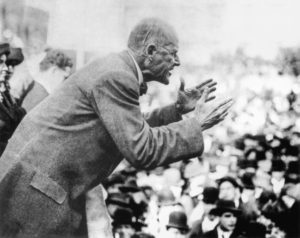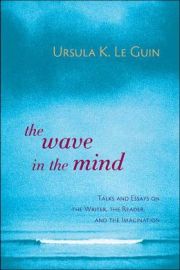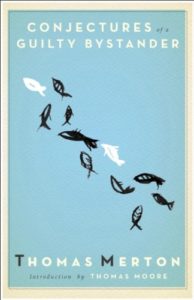“Debs! Debs! Debs!”
February 17, 2019“What is socialism? Merely Christianity in action. It recognizes the equality in men.”
The New Yorker Eugene V. Debs and the Endurance of Socialism/Half man, half myth, Debs turned a radical creed into a deeply American one.
Every man who worked on the American railroad in the last decades of the nineteenth century became, of necessity, a scholar of the relations between the rich and the poor, the haves and the have-nots, the masters and the slaves, the riders and the ridden upon. No student of this subject is more important to American history than Debs, half man, half myth, who founded the American Railway Union, turned that into the Social Democratic Party, and ran for President of the United States five times, including once from prison.
Debs was born in Terre Haute, Indiana, in 1855, seven years after Marx and Engels published “The Communist Manifesto.”
In a new book, “Eugene V. Debs: A Graphic Biography” (Verso), drawn by Noah Van Sciver and written by Paul Buhle and Steve Max, Debs looks like an R. Crumb character, though not so bedraggled and neurotic.
People could listen to him talk for hours. “Debs! Debs! Debs!” they’d cry, when his train pulled into a station. Crowds massed to hear him by the tens of thousands. But even though Debs lived until 1926, well into the age of archival sound, no one has ever found a recording of his voice. When Nick Salvatore wrote, in his comprehensive biography, “Eugene V. Debs: Citizen and Socialist,” in 1982, “His voice ran a gamut of tones: mock whisper to normal conversation to full stentorian power,” you wonder how he knew. Debs could speak French and German and was raised in the Midwest, so maybe he talked like the Ohio-born Clarence Darrow, with a rasp and a drawl. Some of Debs’s early essays and speeches have just been published in the first of six volumes of “The Selected Works of Eugene V. Debs” (Haymarket), edited by Tim Davenport and David Walters. Really, he wasn’t much of a writer. The most delightful way to hear Debs is to listen to a recording made in 1979 by Bernie Sanders, in an audio documentary that he wrote and produced when he was thirty-seven years old and was the director of the American People’s Historical Society, in Burlington, Vermont, two years before he became that city’s mayor. In the documentary—available on YouTube and Spotify—Sanders, the Brooklyn-born son of a Polish Jew, performs parts of Debs’s most famous speeches, sounding, more or less, like Larry David. It is not to be missed.
https://www.newyorker.com/magazine/2019/02/18/eugene-v-debs-and-the-endurance-of-socialism
“A new kind of left-wing doctrine is emerging,” The Economist writes in its lead article [AXIOS]:
- 28 years after the collapse of the Soviet Union in 1991, “socialism is back in fashion.”
- “In America Alexandria Ocasio-Cortez, a newly elected congresswoman who calls herself a democratic socialist, has become a sensation even as the growing field of Democratic presidential candidates for 2020 veers left. In Britain Jeremy Corbyn, the hardline leader of the Labour Party, could yet win the keys to 10 Downing Street.”
- “Whereas politicians on the right have all too often given up the battle of ideas and retreated towards chauvinism and nostalgia, the left has focused on inequality, the environment, and how to vest power in citizens rather than elites.”
“Socialism is storming back because it has formed an incisive critique of what has gone wrong in Western societies.”
“For an instant, everything was bathed in radiance.” -Gilead
The 23 most unforgettable last sentences in fiction.
Ron Charles, for the Washington Post
[pay wall]
Ageism
Ursula K. Le Guin:
For old people beauty doesn’t come free with the hormones, the way it does for the young… It has to do with who the person is.
❁
But all the same, there’s something about me that doesn’t change, hasn’t changed, through all the remarkable, exciting, alarming, and disappointing transformations my body has gone through. There is a person there who isn’t only what she looks like, and to find her and know her I have to look through, look in, look deep. Not only in space, but in time.
❁
That must be what the great artists see and paint. That must be why the tired, aged faces in Rembrandt’s portraits give us such delight: they show us beauty not skin-deep but life-deep.
[Maria Popova]
[Helen Keller surrounded by a group of young dancers at Martha Graham’s studio, including Graham herself. (1954)
Image: Perkins School for the Blind Archive]
“Nation-states, when they form, imagine a past.”
“Nationalism’s largely unpredicted resurgence is sobering,” Foreign Affairs editor Gideon Rose writes in introducing his new cover.
The advocacy of … nationalism … drove some of the greatest crimes in history. And so the concept became taboo in polite society, in hopes that it might become taboo in practice, as well. Yet now it has come back with a vengeance.
Jill Lepore, Harvard history professor and New Yorker staff writer, concludes in
At the close of the Cold War, some commentators concluded that the American experiment had ended in triumph, that the United States had become all the world. But the American experiment had not in fact ended. A nation founded on revolution and universal rights will forever struggle against chaos and the forces of particularism. A nation born in contradiction will forever fight over the meaning of its history.
The endurance of nationalism proves that there’s never any shortage of blackguards willing to prop up people’s sense of themselves and their destiny with a tissue of myths and prophecies, prejudices and hatreds, or to empty out old rubbish bags full of festering resentments and calls to violence. When historians abandon the study of the nation, when scholars stop trying to write a common history for a people, nationalism doesn’t die. Instead, it eats liberalism.
Maybe it’s too late to restore a common history, too late for historians to make a difference. But is there any option other than to try to craft a new American history—one that could foster a new Americanism?
September 30th, 2019
The Correspondent will launch as your platform for unbreaking news on September 30, 2019.
In order to launch on September 30, we’ll build a team of correspondents that help us understand the world around us. As we start to do that, we want to get a better sense of what you — our 47,000 members — deem the most important developments or topics for them to cover.
Some of you already shared your brilliant ideas with us during our crowdfunding campaign. Thank you to everyone who got in touch when we asked this question back in November.
Since then, an additional 30,000 members have joined our movement, so we want to give everyone another opportunity to contribute!
So, what topics and developments would you like The Correspondent to cover? Let us know here.
We’ll carefully read all your suggestions, and they’ll shape the unbreaking news we create together!
Rob Wijnberg
Founding Editor
The Constitutional clock is ticking.
‘From today forward we are living in Constitutional time. Which news organizations will rise to the moment?’
-Jay Rosen, NYU
__
#CitizenJournalism
[A basis of democracy that encourages citizens to actively participate in social processes.]
__
‘Democracies rarely collapse suddenly, with tanks rolling through the streets out of a blue sky. It’s a slow death of a thousand cuts to rights, norms, the rule of law.
The groundwork is to turn the people & leaders against institutions of democracy: the free press, political opposition, independent judiciary & law enforcement, the truth. The infallible leader is the substitute for all of it.’
Garry Kasparov
Human Rights Foundation
25th Amendment
The 25th Amendment, proposed by Congress and ratified by the states in the aftermath of the assassination of President John F. Kennedy, provides the procedures for replacing the president or vice president in the event of death, removal, resignation, or incapacitation. The Watergate scandal of the 1970s saw the application of these procedures, first when Gerald Ford replaced Spiro Agnew as vice president, then when he replaced Richard Nixon as president, and then when Nelson Rockefeller filled the resulting vacancy to become the vice president. Read more from the Congressional Research Service…
“The greatest need of our time is to clean out the enormous mass of mental and emotional rubbish that clutters our minds and makes of all political and social life a mass illness. Without this housecleaning we cannon begin to see. Unless we see, we cannot think. The purification must begin with the mass media. How?”
-Thomas Merton, Conjectures of a Guilty Bystander [1968]












